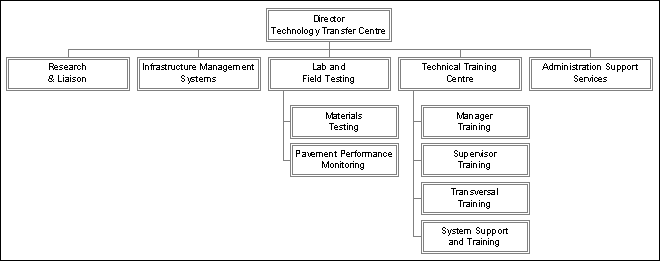|
Technology TransferVisionTo further the KwaZulu-Natal Department of Transport’s vision of ‘‘Prosperity through Mobility’’ by becoming the leading centre for the development and transfer of relevant transportation technologies for the department. MissionThe mission of the Technology Transfer Centre is to package innovative solutions and empower transport officials through research, and training. ObjectivesThe Centre will pursue the following objectives:
ServicesTo address the objectives outlined, the T2 Centre is divided into four components namely, Research and Liaison, Laboratory and Field Testing, Infrastructure Management Systems, and Technical Training Centre. Administrative support, though not separate in itself, can be considered as the fifth component since its functions include the management of the Resource Centre. Detailed functions of each of the components are outlined below ResearchThe department faces many challenges that impact negatively on its ability to deliver on its mandate of providing a safe and efficient road network in the province. There is a need to carry out research in order to explore ways of meeting the challenges.. Some areas that have been identified as potential targets for research include:
Technical Training CentreMaintenance needs in the province continue to increase each year at a rate much higher than real term budget increases. At the same time, the progress of clearing backlogs in infrastructure provision remains slow. It is therefore imperative that available resources are utilized as efficiently as possible. Departmental efficiency is dependent upon a well trained workforce. The shortage of skilled technical manpower is as much a departmental problem as it is a national one. The following factors have intensified the need for comprehensive and extensive internal training programs:
The Technical Training Centre will perform among others the following functions:
Laboratory and Field TestingThe Laboratory and Field Testing component will perform the following functions:
Infrastructure Management SystemsThe Infrastructure Management Systems component will maintain, carry out analysis and report on the results of infrastructure management systems in the department. These include :
Administrative SupportEvery year hundreds of reports, manuals and other documents are produced by various components of the department. The documents are usually not properly catalogued nor housed in a single location. As a result, potential users are often unaware of the existence of relevant reports or cannot locate them, a situation that often results in duplication of efforts and general inefficiency. There is a need for a central repository for departmental reports, transportation information, research updates, relevant legislative news as well as training opportunities. The T2 Resource Centre was set up under Administrative Support to address this problem. The Resource Centre performs the following functions:
Additional functions of Administrative Support include:
T2 Structure
|
